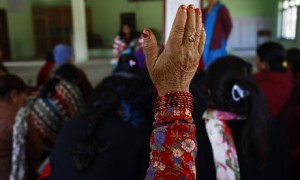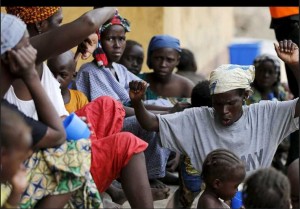Today, on the International Day for the Elimination of Violence Against Women, Uganda is taking an important step forward to protect women and girls by launching its National Action Plan on the Elimination of Gender-Based Violence.

I commend the government of Uganda, especially the Ministry of Gender, Labour and Social Development, on acknowledging gender-based violence as a prevalent problem in Uganda. It is not just my hope, but that of all Ugandan women, to see this plan thoroughly implemented and enforced.
This plan, however, represents just a small part of what must be done to protect Uganda’s girls and young women. We must do more to ensure they will have a better, brighter, and less violent future. Uganda’s ultimate success depends on the kind of future we provide for the millions of young girls and women in this country.
According to Uganda’s own statistics, the average Ugandan is a 14-year-old girl, living in a rural area. She has a one in four chance of becoming pregnant during adolescence, is at high risk of being in an early marriage, and will likely drop out of school before reaching the secondary level.
She is also twice as likely to be living with HIV as a boy her age, since adolescent girls and young women now account for 71 per cent of new HIV infections in Uganda. This girl’s future does not appear to be bright. If she is not set up to succeed and thrive, then how can Uganda?
Gender-based violence comes in many forms, including physical violence, rape and sexual assault, child and forced marriages, female genital mutilation, human trafficking, and the denial of resources and services.

Any act that results in, or is likely to result in, physical, sexual, psychological, or economic harm to women is a violation of human rights and a form of discrimination.
These types of violence are widespread and can affect all people, regardless of social, economic, or political status.
There’s no doubt that we all live under the threat of violence, including the men and boys who are also victims. But the sad fact is, due to societal attitudes that tend to put lesser value in women, giving them less power over their own lives, girls and women are most often the victims.
Worldwide, an estimated one in three women will be physically or sexually abused in her lifetime. No country is immune from this. In the United States, nearly one in five women has been raped or sexually assaulted, and one in four women has been physically abused. In Uganda, these statistics are unfortunately even higher.
The last Ugandan Demographic Health Survey shows that 56 per cent of women age 15 to 29 have experienced physical violence since the age of 15, and 28 per cent of women have experienced sexual violence in their lifetime. That means that more than half of Ugandan women – mother, wives, sisters, and daughters – do not feel safe because they have been abused at home, at school, or at work.
Many women and girls suffer in silence, both physically and emotionally, as social forces such as extreme poverty, impaired access to employment and education, divorce restrictions, land grabbing after the death of a husband, and legal marginalisation serve to limit their access to solutions to their problems.
This situation is unacceptable. If we are dedicated to protecting the rights of everyone, we all need to do more to reverse such trends. We must do more not just to improve the health and safety of individual girls and women, but also to ensure Uganda’s future success and prosperity. Gender-based violence doesn’t only violate girls’ and women’s human rights; it robs society and the world of their talents, knowledge, and ability to contribute.
As a child, I was fortunate to have had parents and teachers in my life who provided opportunities that allowed me to reach my potential. As a mother today, I want the same thing for all of my children, especially my daughter.
By working together to end gender-based violence, we can give all girls the chance to succeed. We won’t solve the problem by simply making this a “women’s issue,” which often becomes code for doing little more than talking about the issue with few resources attached. Stopping gender-based violence is and must be an issue for everyone, men and boys included.

